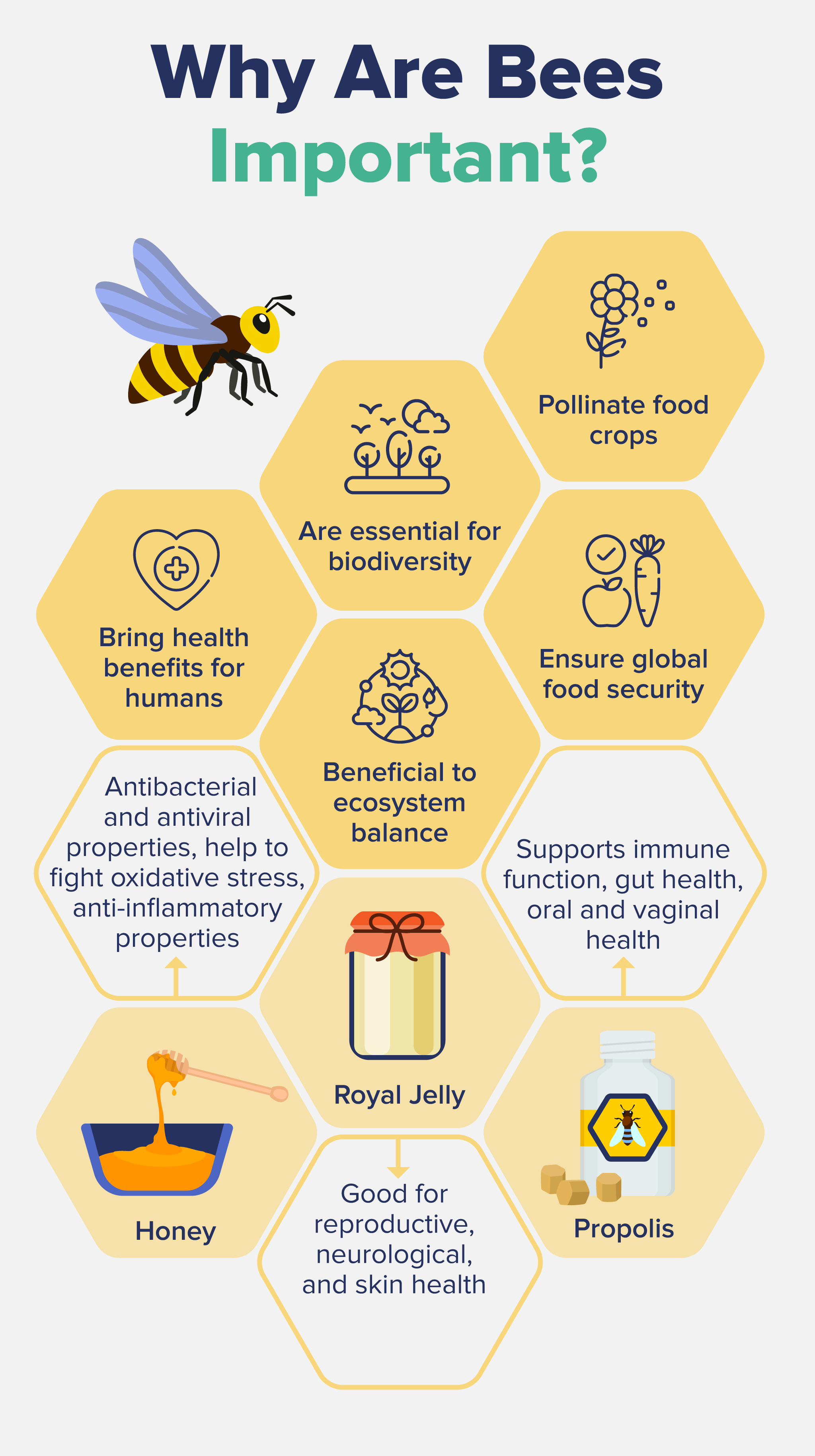Save $40 on your initial consult with a TNI Dietitian!
Talk to a real Dietitian for only $99: Schedule Now
This post contains links through which we may earn a small commission should you make a purchase from a brand. This in no way affects our ability to objectively critique the products and brands we review.
Evidence Based Research To fulfill our commitment to bringing our audience accurate and insightful content, our expert writers and medical reviewers rely on carefully curated research.
Read Our Editorial Policy
A lot of people see bees as little more than a stinging annoyance—but bees are absolutely vital to the health of both humans and the environment.
As the role of bee-pollinated plants becomes increasingly significant in global food production and nutrition—coupled with the issue of declining honey bees and wild bee species—it’s more important than ever to learn about how bees benefit our health.

In this article, discover how humans and bees are intrinsically linked and the top health benefits of bee products like honey, royal jelly, and propolis.
Pollination—the transfer of pollen from one flower to another—is a fundamental process for the survival of many flowering plants, including those we eat. This pollen transfer allows plants to reproduce, leading to the creation of many fruits, vegetables, and seeds that are relied on around the world for food.
Bees are among the most effective pollinators, carrying pollen on their bodies while foraging for nectar and fertilizing the plants.1
Without bees, many food crops—like almonds, apples, tomatoes, cucumbers, coffee, and more—would have reduced yields or not grow at all, significantly reducing the global food supply.
These plant foods are rich in essential vitamins, minerals, antioxidants, and fatty acids (in the case of nuts and seeds) that benefit human health.
Without them, shortages of nutrient-dense food would occur, leading to lower intake of essential micronutrients (like vitamins A and C, folate, and antioxidants) and more people would rely on ultra-processed, factory-made food (even more than we already do).
We all know that honey is a sweet and delicious treat—but there are several other bee products with even more nutritional value and potential health benefits.
Of all bee products, honey is the most well-known—and for good reason.
Honey has been used for millennia, both in culinary and medicinal practices, for its antibacterial and antiviral properties (in fact, did you know that honey is the only food that never spoils?).
Raw honey is especially beneficial, containing vitamins, minerals, antioxidants, and enzymes not always present in pasteurized honey.
Some bioactive compounds found in floral types of honey include p-coumaric, gallic acid, caffeic acid, and ferulic acid, which are phenolic acids that help fight oxidative stress.2 Honey also has anti-inflammatory properties, which may play a role in protecting against cardiovascular, cognitive, and digestive disorders.2
Royal jelly is a nutrient-rich secretion made by worker bees to nourish the queen bee—and its health benefits live up to its regal name.
Research shows that royal jelly contains many bioactive molecules and amino acids, including anti-inflammatory, antioxidant, anti-cancer, and anti-fungal compounds.3
Due to these beneficial compounds, studies have linked royal jelly to improved reproductive, neurological, and skin health (including wound healing and fighting photoaging).3
Propolis is known as the “bee glue,” a resinous substance that bees accumulate from plant species to seal holes and cracks in the beehive. It’s also been shown to retain the hive’s temperature and prevent predator invasion.
In humans, propolis has shown promise for its antiseptic, anti-inflammatory, antioxidant, antibacterial, antifungal, antiulcer, anticancer, and immunomodulatory activity.3
Propolis is particularly well-known for supporting immune function, gut health, and even oral and vaginal health, thanks to its antiviral and antifungal properties.
Although bees are not extinct, their populations are declining due to increased pesticide use and urbanization, which causes habitat loss.
Monoculture farming—where only one crop, like corn or soy, is grown—reduces biodiversity and weakens bee populations by limiting their food sources.
Bees are needed to preserve healthy ecosystems. When they pollinate wild plants, bees support biodiversity and ensure that other plants can survive. Then, these plants provide food for other animals (including us).
Essentially, if bee populations continue to drop, it’s not just our food supply at risk—entire ecosystems could be taken out of balance, leading to effects on biodiversity and food security worldwide.
Bee-friendly practices, like planting wildflowers, reducing pesticide use, and supporting bee-friendly brands, can help ensure these little pollinators survive and thrive.
One such business is Savannah Bee Company, a family of beekeepers making products that go far beyond just honey—they also have royal jelly, propolis, and focus on conservation efforts (like the Bee Cause Project), educational programs, and partnerships.
Bees are far more than just buzzing and stinging insects—bees pollinate food crops and are absolutely essential for biodiversity, global food security, ecosystem balance, and human health.
From their ability to pollinate nutrient-rich fruits and vegetables to producing antioxidant-loaded products like honey, royal jelly, beeswax, and propolis, it’s safe to say that life as we know it depends on the humble bee.
By choosing pollinator-friendly practices to support native bees and choosing sustainably sourced bee products, we can help protect these vital creatures—and our own health and environment, too.